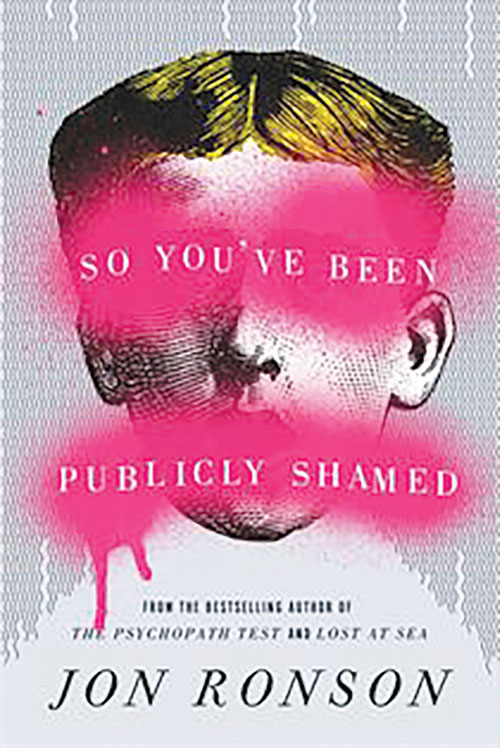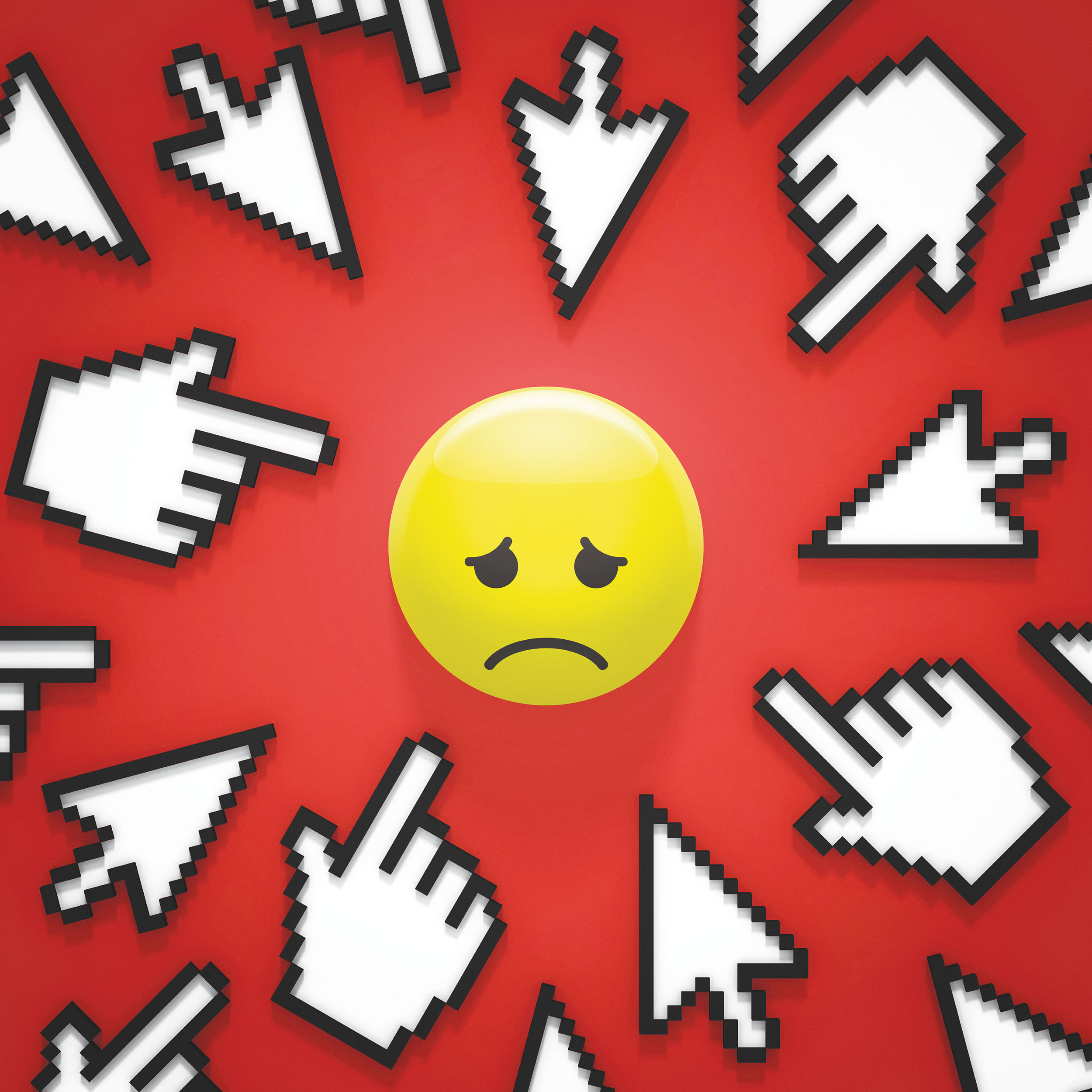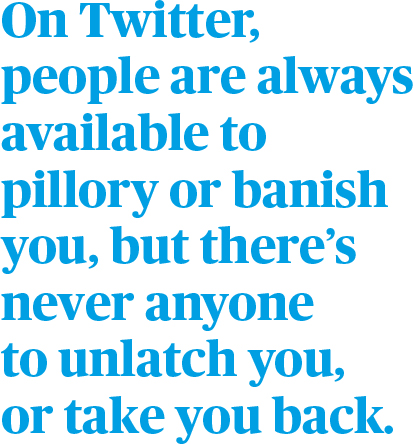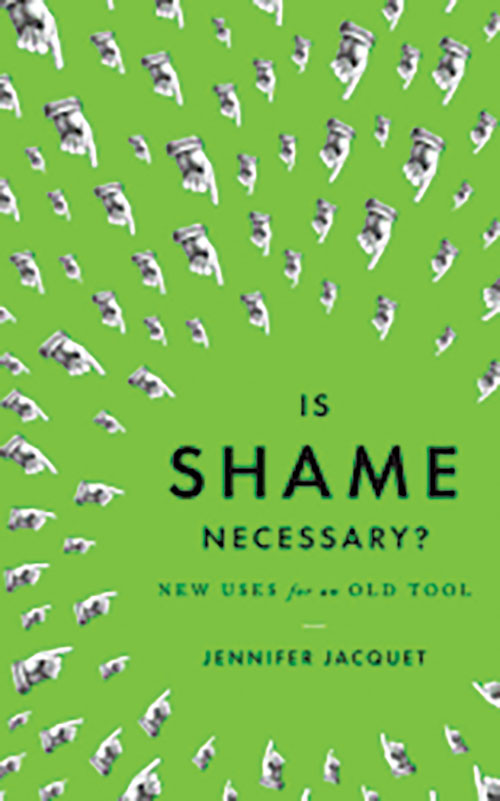
Presenting the Best Picture award at this year’s Oscars, Sean Penn did all the right things to provoke a public shaming, and only by the grace of his hyper-celebrity did he escape unshamed. He split the envelope’s seal and stood squinting at the winner’s name. Then he paused dramatically and mumbled to no one in particular: “Who gave this son of a bitch his green card?” The winning film was Birdman, which meant the son of a bitch in question was Alejandro González Iñárritu, its Mexican producer, director, and co-writer. Within minutes, “Sean Penn” was trending on Twitter as viewers accused Penn of making a racist joke. But even with popular websites lowering their lips to it and blowing hard, the spark of umbrage never found its tinder. Counter-tweets noting Penn’s long friendship with Iñárritu began circulating, and, by the next morning, Iñarritu himself declared Penn’s joke “hilarious.” Penn’s Twitter-shamers sheathed their pitchforks and went home.
Justine Sacco, a PR executive from Long Island, wasn’t so lucky. As Jon Ronson narrates in So You’ve Been Publicly Shamed, Sacco’s shaming ordeal began when she tweeted one last wisecrack before flying off on a South African vacation: “Going to Africa. Hope I don’t get AIDS. Just kidding. I’m white!” That this tweet was meant to be doleful instead of callous—a grim take on the unfair distribution of suffering in the world, not a direct statement of Justine Sacco’s gratitude that it’s black people in Africa getting AIDS, and not her—didn’t matter to Gawker’s Sam Biddle. Biddle re-tweeted it to his 15,000 followers, after which it was re-tweeted thousands more times. By the time Sacco’s plane landed in Johannesburg, her life and career were destroyed.
Ronson gathers Sacco’s and several other shaming nightmares into a chronicle of self-righteous cruelty, but he falters when he moves on to explore ways his subjects might heal themselves. His failure to look at shaming in traditional, communal settings renders his treatment of redemption in these modern cases shallow, even glib. He doesn’t seem to get how big the challenge of redemption really is. What’s unique about modern shaming by virtual communities is also what makes redemption from it impossible. On Twitter, people are always available to pillory or banish you, but there’s never anyone to unlatch you, or take you back.
His list of examples is long. Lindsay Stone had a friend take her picture as she stood yelling and flipping the bird to a sign requesting “Silence and Respect.” The sign, alas, was at Arlington National Cemetery, and soon people who were convinced she was flipping the bird to military sacrifice were threatening her life and demanding she lose her job, which she did. The science writer Jonah Lehrer was shamed—understandably—when readers discovered that he had made up quotes that were supposed to have been uttered by Bob Dylan. Uglier, though, was a second shaming, when Lehrer emerged from hiding to speak before a Miami writers’ conference in a clumsy bid at forgiveness. His talk was live-broadcast online, generating a frenzy of Twitter-hate that was projected onto a screen behind him as he spoke.
Then, for contrast, there’s Max Mosley, son of the notorious British fascist Oswald Mosley. After the tabloid News of the World secretly photographed Mosley in what it claimed was a Nazi-themed S&M orgy, Mosley proved that the orgy was not Nazi-themed, and, thanks to this simple matter of fact, the humiliation his accusers had readied for him was visited on them instead.

Ronson, a British writer and documentarian, moves with a filmmaker’s swiftness through these unhappy stories, which have real power and will induce outrage and indignation in anyone capable of empathy. It’s edifying to see these episodes treated as blips on a filmmaker’s schedule. The breezy treatment highlights how evanescent and shallow their defining outrage really was. Many of Sacco’s accusers, for example, pounced on the fact that she worked in PR. “That she was a PR chief made it delicious,” Biddle told Ronson—almost admitting that Sacco’s real crime wasn’t being racist but failing to control her image, the perception she was racist. Whose perception? Well, theirs, the people calling her a racist while cackling about her PR flub. It’s as if they were saying: “She should have known we’d use the irony of her job to justify misreading her tweet. She’s in PR!”
Grasping the pettiness of these episodes, seeing them as creatures of a given moment and not expressions of a defensible or even coherent position, forces an obvious question upon us: Where do they come from? Or, to put it another way, what are they? On this, the restless Ronson is no help. He has galvanizing stories but no real ideas.
This is especially clear in the recovery side of his book, in which Ronson explores ways his shame-victims might find some healing or redemption—a shame therapy group, a “shame porn” film set. These explorations make the book feel half-done, not just because they read like padding but because they are simply inapt in cases of digital shaming. In traditional settings, shame is at least comprehensible to those who endure it; Hester Prynne knew what she was getting into. Ronson’s subjects are blindsided. Shame visits not just as cruelty but as caprice—invisible strangers yelling about something you didn’t even know was a transgression until they started yelling about it. Because Ronson doesn’t pause to consider traditional shaming in any depth, he can’t convey the violent suddenness and strangeness—the arbitrariness—that makes its modern, digital variant uniquely scary.

All these nightmares make it bitter timing for Jennifer Jacquet to be releasing a pro-shaming book, entitled Is Shame Necessary? An environmental social scientist at New York University, Jacquet studies the social context of global environmental policy. Nearly all international efforts are haunted by the collective-action problem, a central puzzle of modern political science: How do we fashion cooperation when there’s no common authority to enforce it, especially when everyone has to sacrifice for anyone to benefit? Without a world government, the incentives to keep doing the things that cause climate change will override humanity’s general interest in mitigating it. (“Why should we sacrifice when the Chinese are just gonna cheat?”)
Jacquet makes the classic distinction between the private nag of guilt and the social death of shame. Environmentally anxious Westerners tend to compensate for their political impotence with guilt-based “green” consuming, which Jacquet rightly disdains. Green shopping tells people they’ve “acted” when they’ve done almost nothing. It’s easily gamed by producers, and it’s structurally limited in its reach: Businesses will make costlier eco-goodies only if they can fetch a price premium, which consumers will pay only if they get the gratification of feeling superior to the horde of yokels buying GMO ham at the Piggly Wiggly.

Climate change presents huge and urgent problems, and if shame is to be part of their solution, Jacquet needs to theorize about shame on a world-changing scale, as Kwame Anthony Appiah did in The Honor Code. In that book, Appiah credited shame with the demise of several barbarous practices—dueling in Britain, foot-binding among Chinese aristocrats, and, most gravely, the Atlantic slave trade. Of course, shame alone didn’t end these things, which many opposed already, but it helped. Exploring historical parallels of this sort would have helped Jacquet with her titular question, which her book does more to provoke than to answer: Is shame necessary?
Jacquet attempts to assemble a ground-up portrait of shame, augmenting lab studies and magazine articles with random pop-culture references. But the more examples she adds—satire like The Daily Show, surprise phone calls by Ira Glass to NPR free-riders, Alan Sokal’s hoax against the postmodern journal Social Text—the blurrier her portrait of shame becomes. By insisting that shaming is all around us, Jacquet makes it look trivial—not to mention ineffectual. If our planet’s fate rests on the shaming of corporate bad apples and paralyzed governments, then we might think of getting started on that moon colony.
One thing Ronson gets—and Jacquet seems not to—is that shaming is harsh and ugly in practice. That makes Jacquet’s blithe portrait of it as a means of everyday social regulation a little disquieting. She concedes that shaming can be misused, and she says institutions, not individuals, should probably be the main targets. But this is a book with a section called “The 7 Habits of Highly Effective Shaming,” a book whose examples of effective shaming include publishing the names of tax delinquents and non-voters in local newspapers. For stretches, the book calls to mind the surveillance state, only turned inside-out and democratized, Shirley Jackson-style. (“Git us some good rocks, Jed. There’s new names in the paper!”) Without seeming to realize it, Jacquet has invoked the threat of environmental doom to justify a shaming regime in which small fries sizzle for minor offenses.
Or, more accurately, are sizzled. Shaming doesn’t just happen. It’s something people do to other people. Jacquet fails entirely to look at shaming from this side and to ask if The Scarlet Letter is something we want to base politics on. Ronson disappoints on this score, too, though at least he recognizes that the psychology of shaming is unavoidably vicious, and at least his failures are instructive.

Take the abortive shaming of Max Mosley, Oswald’s kinky son. Ronson suggests that Mosley triumphed over shame because, as the son of a widely despised fascist, he had developed a thick skin and just didn’t care. But it wasn’t indifference that made his victory. It was power. Max Mosley, a multimillionaire and a onetime Formula One chief, was able to don the public mantle of power by being powerful, triumphing in public battle with his accusers. And this power, crucially, had two sides—the moral power of righteously disproving a false accusation and the existential power of triumphing, in public, over humbled foes.
Jonah Lehrer had no such power. He’d actually done what he was accused of doing, and his prior sins against credibility rendered his bid for redemption impotent and contemptible. Nor could Sacco and Stone follow Mosley’s example. The ambiguity of their offenses and the near-anonymity of the offenders (Sacco had fewer than 200 Twitter followers, most of them old friends) gave their accusers a power to define these women, and they lacked the power to fight back. Their weakness was irremediable, and thus irresistible.
The eros of weakness and power that fuels public shaming shows up in one last uncanny and sickening detail of Sacco’s case: the delight her shamers took in the fact that, for 11 hours after she’d sent her fateful tweet, Justine Sacco was in the air, off Twitter, devoid of agency, both deaf and mute, basically unconscious. She was the very image of passivity and proneness and ruin. Her shame-mob, which convened and grew around this image in the hours before she woke to take it in herself, found it highly arousing.
Submit your response to this story to letters@psmag.com. If you would like us to consider your letter for publication, please include your name, city, and state. Letters may be edited for length and clarity, and may be published in any medium.
For more from Pacific Standard on the science of society, and to support our work, sign up for our email newsletter and subscribe to our bimonthly magazine, where this piece originally appeared. Digital editions are available in the App Store (iPad) and on Zinio (Android, iPad, PC/MAC, iPhone, and Win8), Amazon, and Google Play (Android).




